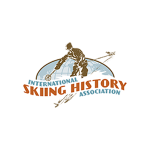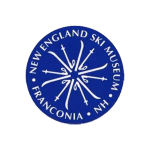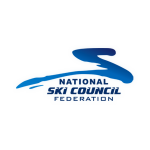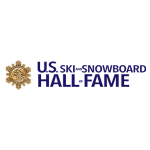Check Your Assumptions: Physical Obstacles Don’t Have To End Your Runs.
The first time I witnessed blind skiers I was blown away. I assumed vision was a prerequisite for being on the slopes, but was I wrong!
That was years ago. Today, adaptive sports programs around the country train both specialized instructors and the visually impaired. The National Ability Center in Park City is the preeminent program for people with physical and mental impairments. It serves as a model for similar efforts around the globe. And groups like the American Blind Skiing Foundation help train instructors to work with the visually impaired. By learning how to ski—or adapt to their visual impairments—people with compromised vision get a sense of independence and are able to gain confidence that can lead to taking on other life challenges. Getting on the slopes also leads to greater contact with friends and families. Then there are the awe-inspiring visually impaired athletes competing in a broad range of Alpine and Nordic events. Visually-impaired Paralympic athlete Danelle D’Aquanni Umstead explains it this way:
“It is a ‘visually impaired team,’ not an athlete and their guide. Guiding is not something just anyone can do. As a guide, you have to be just as committed, ski faster and also be able to turn around at any given moment to look behind you at the other athlete when at high speeds. This is not an easy task, and takes a lot of training as a team. Finding the right guide is definitely the hardest part for a visually impaired skier. To be able to trust in that person one hundred percent, and find a guide who has the same goals as you.”
Which brings me to a spirit-lifting tale told in an April 2014 segment on WBUR, Boston’s Public Radio station. Dick Perkins, 78, and Tony Carleton, 80, Dartmouth Ski Team chums from the 1950s, found a way to keep doing the sport they loved despite encroaching disabilities. Twenty years ago, Tony was hit with a neurological condition that compromised his upper body strength. But, he could still ski! Then, Age Related Macular Degeneration (AMD) made his old friend Dick legally blind.
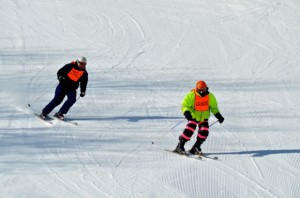
Credit: Sharon Brody/WBUR
Giving new meaning to the expression “lean on me,” Tony, even with his neurological condition, learned to become a ski guide for his legally blind buddy. The two of them now carve graceful patterns together at Wachusett Mountain Ski Area, a 110 acre/1000′ vertical area not far from Boston. “That lifelong identity as a skier is something that’s really sustaining as we age,” said Dick in the WBUR story. “It’s a great feeling to say ‘By gosh, I can do that, and I can do it pretty darn well’.” The story of their skiing partnership and a video can be seen at Skiing Together, Old Friends Conquer Uphill.




